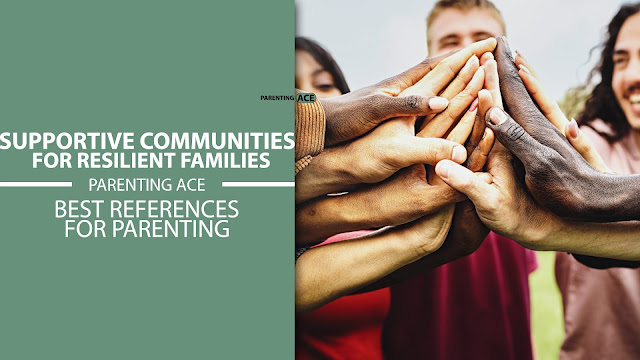Building Supportive Communities: Fostering Strong Bonds and Resilient Families
In today's fast-paced world, the significance of supportive communities in shaping the social dynamics of parenting cannot be overstated. As we navigate the complexities of raising children, the bonds we form within our communities serve as pillars of strength, offering invaluable support, guidance, and solidarity. In this blog post, we delve into the profound impact of building supportive communities on nurturing strong bonds and fostering resilience within families. From shared experiences to collective action, join us as we explore the transformative power of community in empowering parents and enriching the lives of children.
 |
| Supportive Communities for Resilient Families |
In the intricate tapestry of society, the role of communities in shaping the dynamics of parenting cannot be overstated. The concept of building supportive communities goes beyond mere geographical proximity; it embodies the collective responsibility of individuals to create environments where families can thrive, children can flourish, and bonds can strengthen. In this article, we delve into the social dynamics of parenting, exploring how nurturing strong bonds within communities can foster resilience and empower families.
The Importance of Supportive Communities
Supportive communities serve as the bedrock upon which families build their foundations. They offer a network of resources, guidance, and emotional support that parents often rely on in their journey of raising children. Whether it's a helping hand from a neighbor, a supportive gesture from a friend, or a communal celebration of achievements, these interactions reinforce the notion that parents are not alone in their endeavors. Moreover, supportive communities create a sense of belonging and security, providing a safe space for parents to seek advice, share experiences, and form meaningful connections with others facing similar challenges.
Nurturing Strong Bonds Through Shared Experiences
One of the most powerful aspects of supportive communities is the opportunity for shared experiences. Whether it's attending parenting workshops, joining neighborhood playgroups, or participating in community events, these shared activities create opportunities for parents to connect with one another and build meaningful relationships. Through these interactions, parents gain valuable insights, exchange parenting strategies, and find solidarity in the shared joys and struggles of raising children. These bonds not only provide emotional support but also serve as a source of encouragement and inspiration, empowering parents to navigate the complexities of parenthood with confidence and resilience.
Empowering Families Through Collective Action
Supportive communities also play a crucial role in empowering families to advocate for their needs and rights. By coming together, parents can leverage their collective voices to address systemic issues such as access to affordable childcare, parental leave policies, and educational resources. Through grassroots initiatives, community organizations, and advocacy groups, parents can effect positive change at the local, regional, and national levels, creating environments where families can thrive and children can reach their full potential. Moreover, by fostering a culture of inclusivity and diversity, supportive communities ensure that all families, regardless of background or circumstance, have access to the resources and support they need to succeed.
Challenges and Opportunities
While the concept of building supportive communities holds great promise, it is not without its challenges. In today's fast-paced, digitally driven world, community connections are often strained, and social isolation is on the rise. Economic disparities, cultural differences, and systemic barriers further exacerbate the divide, making it difficult for some families to access the support they need. However, these challenges also present opportunities for innovation and collaboration. By harnessing the power of technology, fostering intergenerational relationships, and promoting cultural competency, communities can bridge the gaps and create more inclusive and supportive environments for families.
In conclusion, the social dynamics of parenting are intricately intertwined with the concept of building supportive communities. By nurturing strong bonds, fostering resilience, and empowering families, communities can create environments where every child has the opportunity to thrive and succeed. As we look toward the future, let us reaffirm our commitment to building inclusive, compassionate communities that value and support the diverse needs of families. Together, we can create a brighter, more equitable future for generations to come.



Comments
Post a Comment